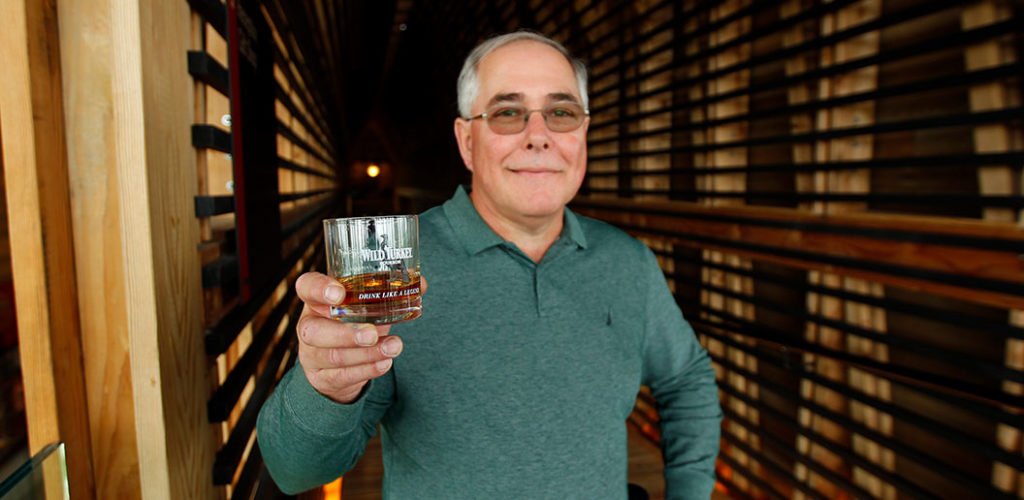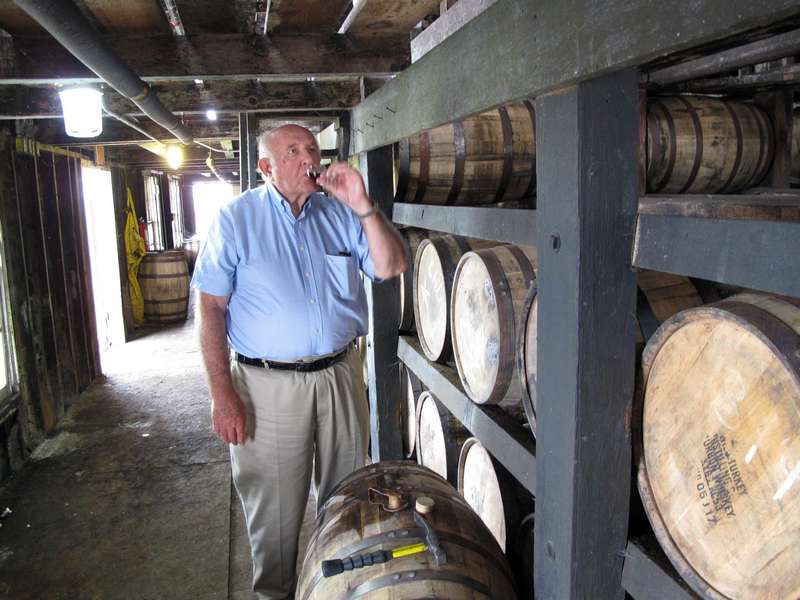
In the American State of Kentucky, about 20 miles West of Lexington, along the banks of the Kentucky river, is a factory, a distillery actually, that manufactures the great American invention known as bourbon.
Up the road is a 3-generational family called the Russell’s. For the last 64 years they have been unapologetically distilling a little bourbon we know as Wild Turkey.
There are many instances of famous fathers whose sons have followed in their footsteps, Julio & Enrique Iglesias, Kirk & Michael Douglas and even Presidents, George H. & George W. Bush.
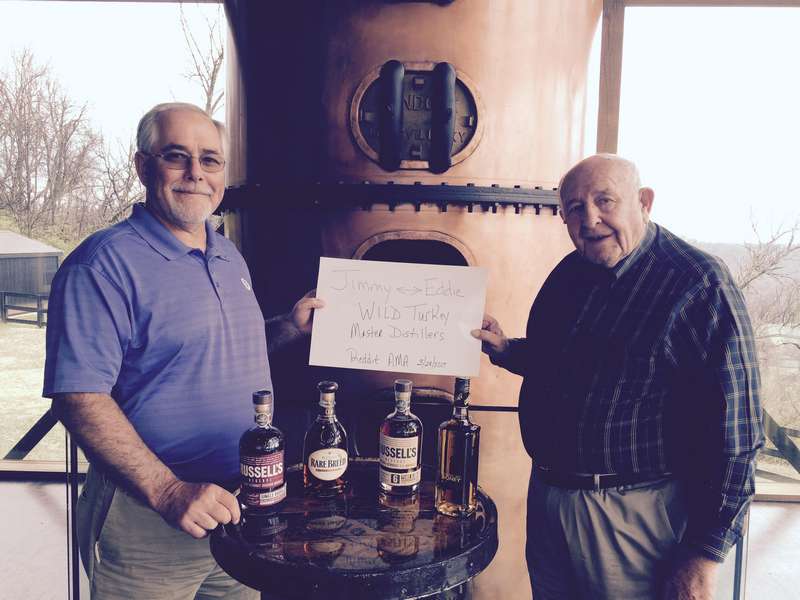 In the bourbon world, that corollary is Jimmy & Eddie Russell. Both have achieved the title of Master Distiller and both have been inducted into the Bourbon Hall of Fame. In the Bourbon world, 84-year-old Jimmy Russell is a Rock Star who holds court with bourbon aficionados wherever he goes.
In the bourbon world, that corollary is Jimmy & Eddie Russell. Both have achieved the title of Master Distiller and both have been inducted into the Bourbon Hall of Fame. In the Bourbon world, 84-year-old Jimmy Russell is a Rock Star who holds court with bourbon aficionados wherever he goes.
In 2014, the now 83 year old master distiller, celebrated his 60th anniversary at Wild Turkey. During his tenure — the longest of any master distiller in the industry — Russell has seen some three million barrels distilled under his supervision. Fittingly, Russell’s milestone fell during National Bourbon Heritage Month and was celebrated with a new special blend, Wild Turkey Diamond Anniversary, crafted by Jimmy’s son, Eddie, who himself has spent 37 years with the company.
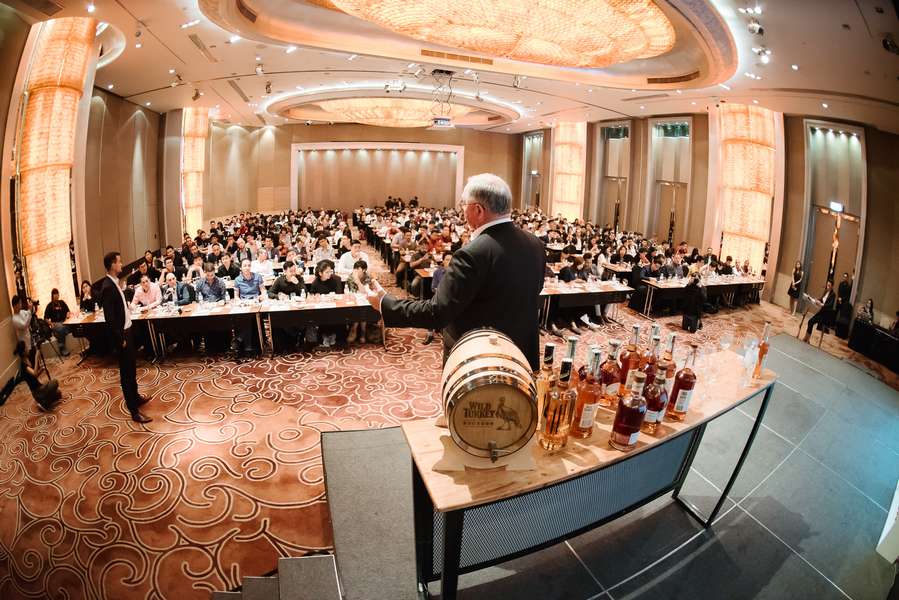 Eddie Russell was recently in Bangkok to share his knowledge of Bourbon to well healed bourbon drinkers as well as to 200 Bangkok based bartenders at a special event held at the Pullman Grande Sukhumvit hotel. It is here that HOT Magazine had the distinct pleasure of sitting down with Eddie to discuss bourbon and his family’s place in its history.
Eddie Russell was recently in Bangkok to share his knowledge of Bourbon to well healed bourbon drinkers as well as to 200 Bangkok based bartenders at a special event held at the Pullman Grande Sukhumvit hotel. It is here that HOT Magazine had the distinct pleasure of sitting down with Eddie to discuss bourbon and his family’s place in its history.
HM: Eddie, we saw a few facebook posts of you with a large group of Bourbon connoisseurs at the Character Whiskey and Cigar Bar in Bangkok two nights ago and it looks like they were enjoying hanging out with you.
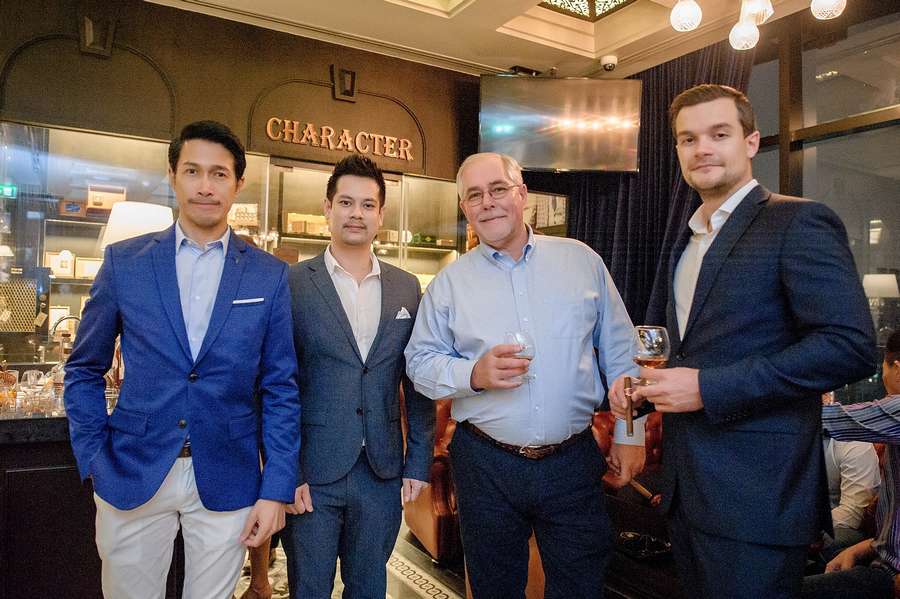 ER: Yes, when I travel like this I always make a point to get out and meet the consumers but what I’m mainly here to do is to educate the bartenders because they are your first ambassador. They are talking to their customers, serving a bourbon drink and sharing their knowledge about it
ER: Yes, when I travel like this I always make a point to get out and meet the consumers but what I’m mainly here to do is to educate the bartenders because they are your first ambassador. They are talking to their customers, serving a bourbon drink and sharing their knowledge about it
HM: How do you become a master distiller?
ER: Well, there’s no school, no appointment, no test. When I came thru, a master distiller was someone who started out at the bottom of the barrel so to speak and worked their way up. Now days it’s a little different, people are calling themselves a master distiller when they aren’t even making Whiskey. For my dad, it took about 17 years before he became a master distiller. It was 34 years for me because my dad is still working, you should really only have one master, but its just learning everything. I started as the bottom employee, rolling barrels, mowing grass, painting buildings, whatever anybody else didn’t want to do. I did that for about six years and then my father brought me into the distillery and taught me how to make the yeast and mashes. I worked in bottling, I worked in maintenance and then I took over the maturation end of it, so it’s just learning everything. For me, you can be a distiller but to be a master there shouldn’t be that many of us. When I was growing up there were just 4, Booker Noe, Elmer T. Lee & my dad, Jimmy Russell & Parker Beam, those were the few that were out there. But they had all grown up in the industry and most of them have been past down from generation to generation
HM: You were inducted into the Bourbon Hall of Fame, is that a pretty close-knit organization?
ER: Yes sir, 99% of the bourbon is made in Kentucky and most of us are within 40 miles of each other. We’re all good friends with one another and help each other out. It was really 5 or 6 guys that kept this industry alive when it wasn’t going so well. In the 70’s Bourbon and all brown goods weren’t doing so well because Vodka came out and my generation didn’t want to do anything our parents did so we went with something different.
HM: We read in an interview that you did that you had come from a small town and that you never envisioned that you would follow in your Dad’s footsteps. That you wanted to move to the big city. How small is your home town?
ER: My little hometown is only 10,000 people. The reason we are there is because we’re next to the Kentucky River where we get our water for making Wild Turkey. Growing up I wanted to get a college degree and get away, which was one thing, and the other thing was that my dad worked 7 days a week. I was never out of the State of Kentucky until I got out of high school because my dad worked every day. He worked all the time because he loved what he did. My dad’s 83 and he doesn’t get their everyday anymore, he doesn’t walk so well, but he’s there most days, and he still loves it.
HM: We saw the television interview you and your dad did on Fox News where you mentioned how you got hooked on the distillery.
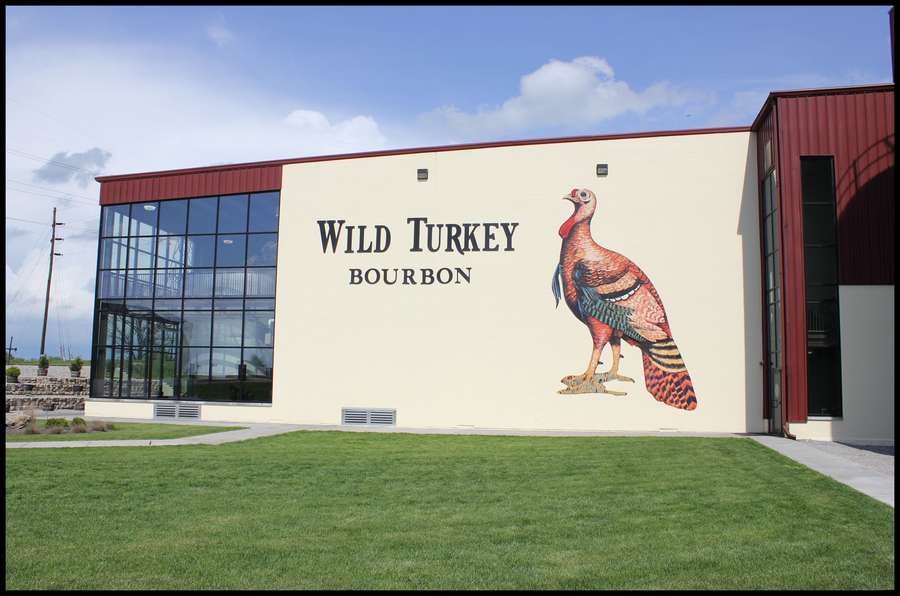 ER: Yeah, I had a year of college left and I was hoping to kind of take it easy that summer. My mother however wanted me out of the house, so I went to work there. It’s a Union atmosphere and I was the bottom man doing the worst jobs but within a couple of weeks I just knew it was home for me. I always tell people that one of the big reasons was that I figured out that they paid my dad to drink bourbon every day. And that’s definitely part of it but it just felt like the place for me. I just loved being there. Most of the people that worked there I had known my whole life, it was and still is a very family type atmosphere.
ER: Yeah, I had a year of college left and I was hoping to kind of take it easy that summer. My mother however wanted me out of the house, so I went to work there. It’s a Union atmosphere and I was the bottom man doing the worst jobs but within a couple of weeks I just knew it was home for me. I always tell people that one of the big reasons was that I figured out that they paid my dad to drink bourbon every day. And that’s definitely part of it but it just felt like the place for me. I just loved being there. Most of the people that worked there I had known my whole life, it was and still is a very family type atmosphere.
HM: Going back to the Fox interview, Jimmy said that you have employees that are 3rd and fourth generation family’s that work there.
ER: Yes, certainly. When I came there, there were husbands and wives, one man had 3 sons there, but mainly in those days the ladies worked on the bottling line and the men worked in the plant, because your foolin with 500 pound barrels. Now adays there are women working out in the plant and the bottling is much more computerized and machine run so you don’t need as many people.
Today it is different, we have a lot of management people, but back then my dad was the master distiller, human resources, union negotiator, everything. Me personally, for years, I hired every person, I took care of all vacations, I got everyone to work every mornin, it’s a little different now. My son is coming along and he won’t have to do that, he’ll be strictly learnin the bourbon business. My son Bruce will be 4th generation and he has been a brand ambassador for us in Texas and he was the same way. He wanted to move to a big town but now he wants to come back and basically apprentice.
HM: When you come out with a new brand like Russell’s Reserve, is that something you and your dad do together or is there a whole group of people involved?
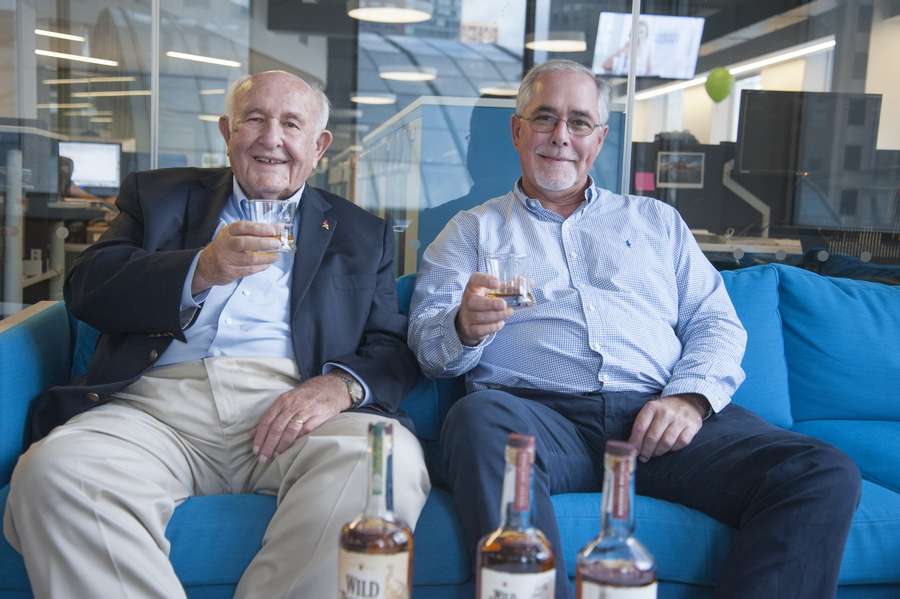 ER: There is only about 5 of us who do the tasting. For my dad and Booker and those guys I always used to tease them that if it was up to them we would have only one brand because they thought they made the best Whiskey. For us it was 8 year old 101. That’s still our biggest seller. For Jim Beam it was White Label.
ER: There is only about 5 of us who do the tasting. For my dad and Booker and those guys I always used to tease them that if it was up to them we would have only one brand because they thought they made the best Whiskey. For us it was 8 year old 101. That’s still our biggest seller. For Jim Beam it was White Label.
Our industry was so small focused; who they promoted too, how they marketed, everything, because they mainly marketed to a 50 and older southern gentleman because that’s who they thought the market was. So me, comin in there as a younger, I wanted to get more people into drinking bourbon. Doing the Russell, it was a little smoother and softer but still had the Wild Turkey spice. We then did the 81, making it more of a mixable bourbon for the bartenders. For my dad, you don’t put anything in the bourbon but some ice cubes.
When I first went out on the road everyone was like, “son, you’ve got some big shoes to fill” because my dad was considered the master distiller of master distiller’s, that’s what his friends called him. I learned really quickly not to screw up what he had built, because he built this company basically. But I had to show my way too and that’s where the Russell’s and the 81’s and a few others I have goin on now. It’s just a little different taste profile to try and bring more people in. But as I said earlier, the bartender community has really changed our industry because the average consumer now is a male or female in the 25 to 40 year old range.
HM: When you sit home at night, and you have the full Wild Turkey product line in front of you, which bottle do you reach for?
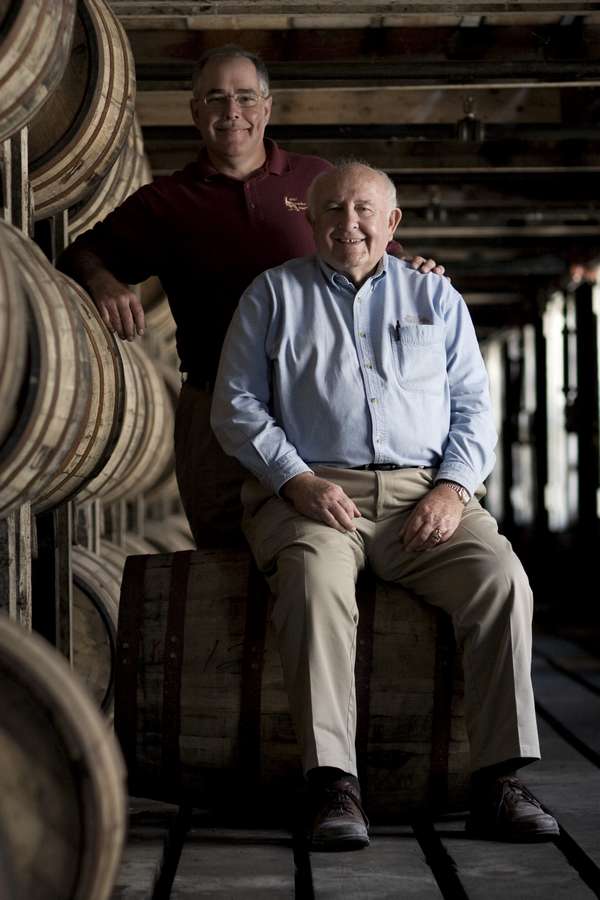 ER: Well I like the Russell’s line because I developed it and its more my taste. I drink more 101 than any product we’ve got because you can get that anywhere, but at home it’s usually Russell. I have a 10 year old and a single barrel Russell. It’s a little different in the taste profile, it’s a little smoother and creamier. My dad and Booker liked a whiskey where you knew you had a drink, it’s big and bold and stuff.
ER: Well I like the Russell’s line because I developed it and its more my taste. I drink more 101 than any product we’ve got because you can get that anywhere, but at home it’s usually Russell. I have a 10 year old and a single barrel Russell. It’s a little different in the taste profile, it’s a little smoother and creamier. My dad and Booker liked a whiskey where you knew you had a drink, it’s big and bold and stuff.
HM: Are you like your dad and just drinking it with ice?
ER: Most of the time but I do enjoy a good cocktail. One of my favorites is a Boulevardier which is bourbon, sweet vermouth, and Campari.
HM: Campari bought Wild Turkey in June of 2009, were there any changes made with the new owner?
ER: No sir, that’s the good thing about our industry, no one really understood how the bourbon industry worked. We were owned by Pernod Ricard, which is the 2nd biggest spirits company in the World, from 1981 to 2009. When they bought us I remember them sending us over a VHS video Cassette and it was the CEO and he said “Jimmy, you just keep doing what your doing.” Most of the brands you make and bottle today and you sell the next day. For us it’s 4 days of making it and then it sits for up to 13 years before we sell it, so we have a lot of money tied up in inventory. Campari has spent a lot of money on us. Pernod got so big we kind of got lost in the shuffle a little bit but Campari came in and spent 50 million dollars building a new distillery, 44 million building a new bottling facility and then a new warehouse. They’ve spent around 120 million dollars on us since 2009. For my little hometown, that’s huge.
HM: With the new factory I would imagine they brought in a lot of new automation.
 ER: Yes sir and I was behind most of that. We didn’t have computers at my distillery until 1990. In fact, I was the I.T. guy at the time because I was the only one who knew much about it. For me we can be much more consistent with computerization and automation. During my dad’s time, every valve was opened and closed by hand and he liked that “hands on” approach but with computerization we’ve become much more consistent.
ER: Yes sir and I was behind most of that. We didn’t have computers at my distillery until 1990. In fact, I was the I.T. guy at the time because I was the only one who knew much about it. For me we can be much more consistent with computerization and automation. During my dad’s time, every valve was opened and closed by hand and he liked that “hands on” approach but with computerization we’ve become much more consistent.
HM: With the advanced automation have you lost employees?
ER: No, we actually have more employees now. Our company owns Sky Vodka and we do their bottling at our plant and when you factor in the growth in Wild Turkey sales we have almost double the number of employees that we used to have.
HM: How big of a facility do you have in Kentucky?
ER: We own 750 acres but that’s because before prohibition there were 13 distilleries in my little home town and now there are just two, us and Four Roses. When prohibition ended we bought up a lot of the ground next to the river. As I said earlier, the river is our water source and the water is very very important to our product. We actually use though about 150 of those acres because we have so many storage buildings. I have 700,000 barrels aging in our 29 storage buildings.
HM: Looking at your international market, has China kicked it?
ER: No, not really but I am going there in August. We’re hoping they take a liking to it but we also have to worry that if they do that we can keep up because what I am making today I won’t be able to sell until 6 to 13 years down the road. This bourbon boom that were experiencing has caused this problem for a lot of distilleries, they weren’t prepared for it. My dad however, with all of his experience, he sort of understood and planned for it. I do long plan forecasting in November and this year I was looking at the year 2030. Marketing and Sales, they have big plans, but someone who has been in it for 37 years, you know there are always ebbs and flows and this has been a really big spike but there will be a leveling off point.
HM: What’s a typical day like for you at the distillery?
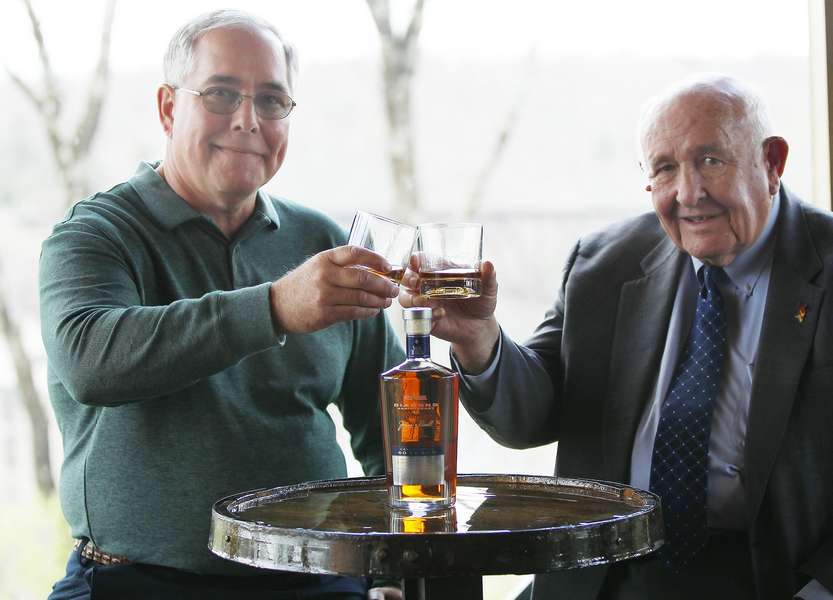 ER: (laughing) Kids always grow up not wanting to be like their father’s but I have turned into my father completely. For me the first thing I do every day, like my dad, is walk around the fermentation tanks and see how it is going. I’ve then got 60 to 80 emails to answer, putting out fires. And then I’m in the lab tasting whiskey, you can’t do the tasting all at one time, so I taste throughout the day. In between I’m checking in with my warehouse gal, checking on what we need to pull and make sure its coming from the right places and I sit in on a lot of meetings, basically making sure all the pieces of the business fit together.
ER: (laughing) Kids always grow up not wanting to be like their father’s but I have turned into my father completely. For me the first thing I do every day, like my dad, is walk around the fermentation tanks and see how it is going. I’ve then got 60 to 80 emails to answer, putting out fires. And then I’m in the lab tasting whiskey, you can’t do the tasting all at one time, so I taste throughout the day. In between I’m checking in with my warehouse gal, checking on what we need to pull and make sure its coming from the right places and I sit in on a lot of meetings, basically making sure all the pieces of the business fit together.
Something else I do is take care of the private single barrel sales, which is quite big in America now. I’ll bring people in and have them taste several barrels and let them choose the one they want. Then it’s back to tasting Whiskey. Also, now that I am the face of Wild Turkey I have to be there to meet with VIP’s who are coming in to take the tour. Those could be big distributors, Big retailers or large bar owners; shakin hands and kissin babies as they say.
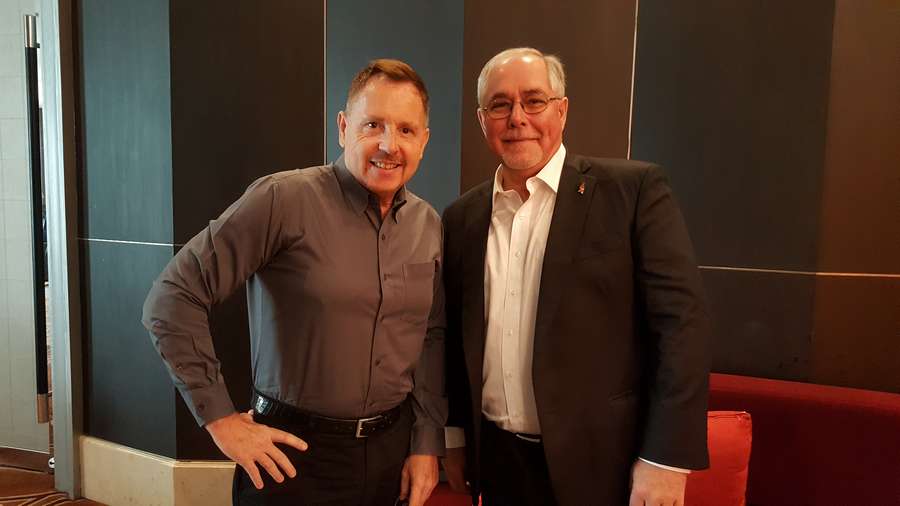 HM: You’ve been here in Thailand for a few days now, where else have you been on this trip?
HM: You’ve been here in Thailand for a few days now, where else have you been on this trip?
ER: It’s been a 16 day tour. I started in Japan and was there for a week. Japan is our 3rd biggest market. When I started in 1981 export was 6% and Japan was probably 5 of that. They’ve always been a great brown spirits market, but it’s ebbed and flowed there. There are a lot more brands there and of course Japan’s Suntory bought Jim Beam Bourbon and they’ve pushed that hard. I’ve also been to the Philippines. I was telling my wife, the last two years I’ve been to Poland, Austria & Switzerland, places I never thought I’d sell bourbon, even the Asian countries where its so warm, you didn’t know whether bourbon would work, but it’s a really good brown spirits market.
HM: Have you had a chance to see any of the city at all?
ER: A little bit, I got to see some temples, rode on a long tail boat, took a tuk tuk, sky train and the subway, so I’ve experienced a lot of great things. It’s been really nice to see some of Thailand, I don’t usually get that luxury.


